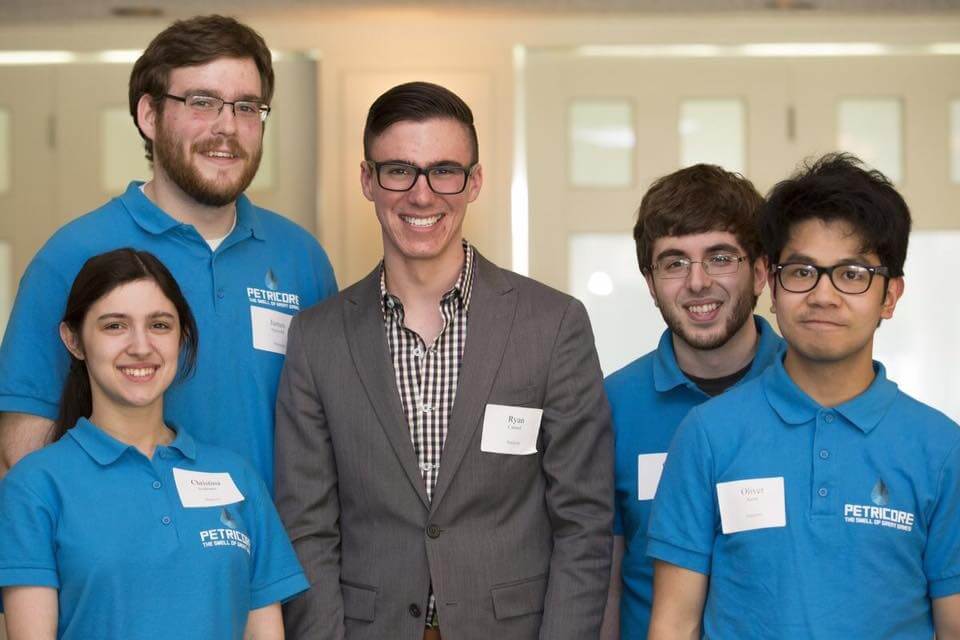Meet The Team Mondays #6 – Ryan Canuel
Meet The Team Monday with Ryan Canuel!
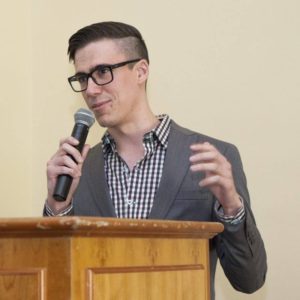 Q: When’d you start gaming and what kind of games do you play?
Q: When’d you start gaming and what kind of games do you play?
A: I was around 7 or 8 when I got Spyro the Dragon on Playstation, which is a bit later than most. I’d grown up living near the woods, so before games I had fun trying to catch frogs and fish, building forts, and pretty much running around. It wasn’t until High School where I started getting into World of Warcraft and other games that began to play a larger role my life. I really love RPGs like Oblivion, Skyrim, Mass Effect, and Simulation games like any of the Roller Coaster Tycoon games and the Civilization games.
Q: What Point did you know games was something you’d want to pursue?
A: I was programming in High School, I’d teamed up with a friend to make a game for our final project. The funny thing was, for that project I programmed and designed the game and he did all the writing and management stuff, haha. I’m not sure when I decided to “turn the table” and try management. But yeah, I used RPG Maker which was a great tool to get started with, I was able to tweak scripts I found online to play videos and other cool stuff I wanted it to do. I really enjoyed it and wanted to keep doing it. I was very fortunate to come from an area where the whole “follow your dreams” mantra applies and my parents encouraged me to pursue my passion for game design.
Q: Why Becker?
A: It was an hour away. It was high on the Princeton Review. I liked the campus. it was close to home and the program wasn’t just an offshoot of a computer science program. It’s one of it’s main pillars.
Q: What were some things that pushed you towards producer role.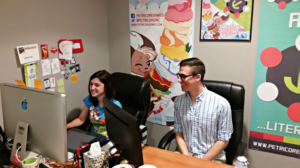
A: Originally I joined as a designer, like an ideas person, but then quickly realized that wasn’t a thing. I tried a bunch of different stuff: art, programming, etc. Which of all the things I liked programming the most and I joke around and say I was a terrible programmer but I wasn’t a bad coder, if I give myself credit. I could’ve become a good coder, but I just couldn’t do that all day; so I have a lot of appreciation for those that do.
My dad was always someone I looked up to and admired. I remember when I was a kid I was asked what I wanted to be when I grew up and I said “I want to be the CEO of People Inc. (Which was the company he worked for)”. Eventually he joined a company that was very much in debt, not doing well at all, but it was a company he really cared for because he worked there when he was getting started. He had a really had a positive influence on the company and grew it into one of the largest human service companies in the area. Watching that I learned two things: a good leader can really change a company and I had a very good businessman as my dad. So because of my father’s influence I always had an interest in the business world. Then going through school I got more comfortable with myself and talking to people, which helped get me ready to do this.
People might joke about CEO’s going out to lunch and golfing all the time, but if you put someone in a position where they need to consistently meet with people and before they meet with them know exactly who they are, what their company does, a bunch of information about that person and finally a compelling reason for them to care about you. There’s a lot of work behind it all that I really enjoy.
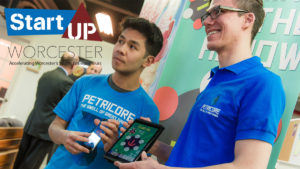 Q: When did you know you’d use your love of Business to start Petricore?
Q: When did you know you’d use your love of Business to start Petricore?
A: I was “pushed” into starting Petricore. I met Monty Sharma, managing director of MassDigi, and he got me into the Summer Innovation Program (SIP), a program run by MassDigi that helps students work on their original ideas and bring them to launch. He let me be a producer during the summer and in the Live Studio class that happens after the summer.
He and I always had one on ones meetings so I told him that I wanted to be in an upper management position, and he asked me “why wait?”. Which resonated with me because he believed we could do it. And the thing that pushed me to ask everyone on the team was that he called me originally and told me there was a project lined up where they wanted a company of contractors. The fact that there was money really reassured me about our future so I called everyone up. Later that project fell through, but I think that was a good tread into the waters of this whole field. Eventually we got our first contract Mentor at Hand and that really got us started, before we’d graduated.
Q: How did it feel to approach the team with this opportunity?
A: It was interesting… I think all I could do was tell them that we’d probably make $1,000 a month each. I’m really lucky that the dream team I wanted all said yes; plus everyone was able to make more than that haha.
Q: What about each of them do you admire?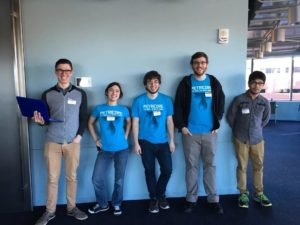
A: So, I’ll do this in the order I met them. I met James (Spav) Spavold Freshmen year. We did a ton of projects together and I always knew: He’s really smart and he’s a good an organized programmer. We always worked on projects together and we had a great working relationship over all the projects at Becker College. I worked with him for so long I respected his abilities and knew what they were.
Same goes for Chris and Christina. For Cat Tsunami, I needed leads for the transition from bringing that game from the summer program to Live Studio (a class MassDiGI runs at Becker College where students work together in a studio setting), people who were as good as the original team members. I remember fighting to keep them as leads because they’d been doing such a great job. So when I started this I knew exactly who I wanted because I just spent a year fighting to keep them on my team. And this time I didn’t have to fight anyone unless they got job offers.
Christina was a really good artist, she won best artist award for graduating in our grade. Chris was a very talented and organized programmer himself. The thing I respected about him was that every time someone on his team would slip he’d let me know in advance or he’d get it done himself without complaining.
Oliver was extremely smart, valedictorian of our class. I always saw him working on a ton of fun and unique games at Becker. He was the one that came up with the ideas and he also came up with Cat Tsunami in the first place. I learned how it was working with him later in Live Code, and gained a lot of respect for everything that he’d done at Becker.
Aaron was the one person I hadn’t worked with. But I’d seen the way that he dealt with people and he was a really great leader because he was very thoughtful and things couldn’t get to him. He was older and very wise: thinking things over before making a decision. I saw the amount of respect that people had for him and that all the programmers looked up to him so I knew that he was someone I wanted on the team. He left on good terms, we still talk all the time; and we all just got lunch together not that long ago.
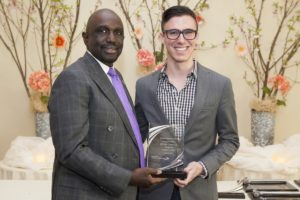 Q: What’s the most exciting part about working at Petricore?
Q: What’s the most exciting part about working at Petricore?
A: I’ll spare you from having to write out the Mind the Arrow message, although it was great: it solidified us as a company and we accomplished something other studios who’d been around much longer we’re still trying to do. So Personally, the most exciting moment for me: we set a fairly substantial financial goal for this year, because last year was a little bit rough given our age and experience. But going into this year we had some experience under our belt and were just looking for partners who trusted us and we’re very fortunate that they found us. We had a goal financially that when I set it sounded crazy to everyone. But we hit that goal by the end of Q3; so much sooner than we expected, which was an awesome feeling. Also winning Entrepreneur of the year was a great feeling because I knew all the other great work happening around Worcester, so to get it was an honor. It was a good example of the work that everyone on the team’s putting into make this dream a reality.
Q: Why’d you set such a high goal?
A: I wanted everybody on the team to have a salary that reaches a point that they can be comfortable. Which can be a tough thing for a start-up of 5 people all in their 20’s. Going into next year, I want that to continue to grow and reward people on the team for the great work everyone continues to do.
Q: What’s a great lesson you’ve learned while working at Petricore?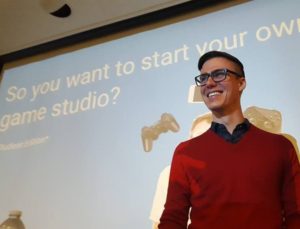
A: I’m getting to know the pains and benefits each person feels within the roles they’re in. It’s a lesson in respecting everyone’s roles and understanding that each person has quirks in the way it gets done. It doesn’t matter how but as long as it does it’s working and they’re happier for it. I think that those who don’t understand what others are doing is a slippery slope to not respecting what they’re doing. When everyone feels like everyone on the team is invested and wants see the company succeed it’s significantly better than people not trusting or liking each other. Understanding what a person is really good at and helping nurture that is extremely important. It’s a big part of how I see my role as the CEO.
Q: How will you make sure the company will progress?
A: Set goals and expectations. Next year we’re really going to focus on our plan for the next few years and figure out how we’re really going to expand our company to tackle bigger projects and get more revenue. Right now I see my job as trying to wrangle up contract work to keep us busy and help us develop our skills that we’ll use to continue to significantly improve our game. We look back and figure out what we did wrong and correct those mistakes until eventually we have a team of avengers-like people that can go forward to make a really terrific game.
Q: What kind of games do you want to see come out of Petricore?
A: I’m not picky because I play a lot of different games. I’m sure everyone has that game they’d make if they had millions of dollars to pay people to make, but I guess mine would be some really ridiculous bigger than Civ 6 .
Q: How about moving out of mobile?
A: Mobile was great place to start but the team is itching to try a different system or platform. But for now we’re gonna stick to mobile because we’re comfortable with it and we’re learning better practices for. I have faith those game design skills will translate over very well.
Q: How about something coming out of Petricore in 5 years?
A: I’d love to build something with some sort of story. A game that takes place in an interesting world with interesting characters that you could fall in love with and would want to come back to.


